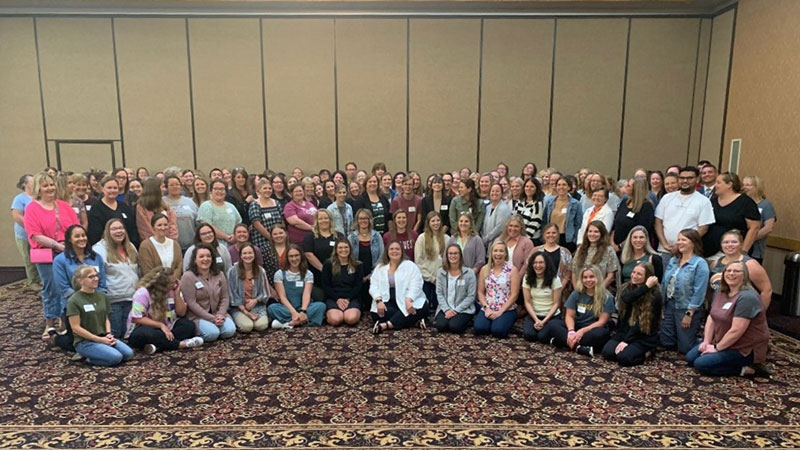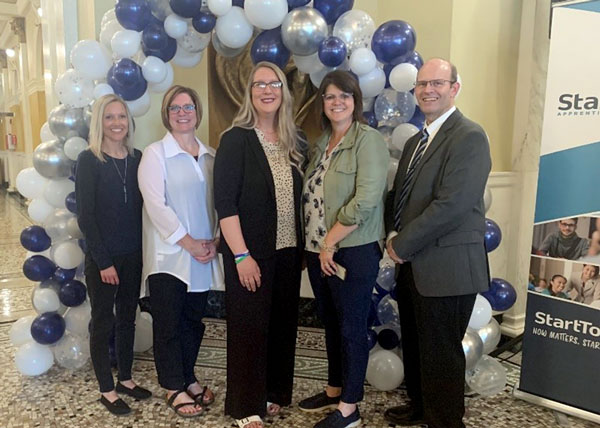Apprenticeship program provides pathway to teacher certification
Throughout schools in South Dakota, paraprofessionals work alongside teachers, supporting the classroom in a myriad of ways. They assist students daily, reinforcing concepts taught by the teacher, supervising students who need extra care, and providing an additional pair of eyes and hands for the classroom teacher.

Teacher apprentices and their mentors gathered in Pierre before the 2024-25 school year began, as part of the orientation to the Teacher Apprenticeship Pathway program.
The TAP program was launched in fall 2023 to address the teacher shortage, which has affected schools in South Dakota – particularly in rural areas -- and throughout the United States.
"We created this program as one solution to the teacher shortage," said Secretary of Education Joseph Graves. "Workforce has been a focus of Gov. Noem since taking office. These apprenticeships provide a clear pathway to filling open positions in our schools – with people who already live and work in our communities and are likely to stay and continue contributing."
The Teacher Apprenticeship Program helps to get qualified teachers into classrooms by recruiting candidates who have already proven themselves alongside certified teachers. Those selected for the program were enrolled in courses at Dakota State University (DSU) or Northern State University (NSU) and were assigned two mentors – one at the school where they continue to work as paraprofessionals, and another at DSU or NSU. The candidates – teacher apprentices -- agreed to continue to work as paraprofessionals at their school, while also taking educator preparation courses asynchronously (meaning they can review lessons at the time of day that best fits into their schedule). With this arrangement, the teacher apprentices could earn their teaching certificate in two years or less, while paying a flat fee of $1,000 per year for tuition. The remainder of the cost is shared among the apprentice's school and the partner organizations, the DLR, BOR, and DOE.
"These are people who have already proven themselves to have the skills necessary to be fine educators," said Graves. "This program will give them the extra knowledge and expertise they need to be successful in a classroom of their own."
The program requires significant support from the school where the teacher apprentices work as paraprofessionals. Not only does the school continue to employ the paraprofessional, but they also supply a mentor teacher to provide the teacher apprentice with advice and support as they go through the program. The school also provides $1,000 per year toward tuition and promises to provide a student teaching opportunity for the teacher apprentice when the time comes.

Kandy Flowers, the first teacher apprentice to graduate from the Teacher Apprenticeship Pathway program, stands with her school support team from Wessington Springs Elementary. Flowers now works as a preschool teacher for Wessington Springs Elementary School.
The teacher apprentice's experience in the classroom is a significant advantage for them as students. "There is no better place to recruit future teachers than our current classrooms in South Dakota," said David DeJong, Dean of the College of Education at DSU. "I am excited for the students of South Dakota who will soon learn from educators who are not only deeply rooted in their communities but also who understand the values, challenges, and strengths of our great state."
Currently, there are 152 teacher apprentices throughout the state participating in the TAP program. Most of the teachers are working on becoming certified in elementary education. Two of the teacher apprentices have already graduated and are working as teachers in South Dakota. Six more will graduate this December.
"I'm incredibly proud to continue being part of such an important project that empowers South Dakota paras to advance their careers and helps address the critical need for skilled educators in our state," said Dr. Anna Schwan, Dean of the Millicent Atkins School of Education at NSU.
